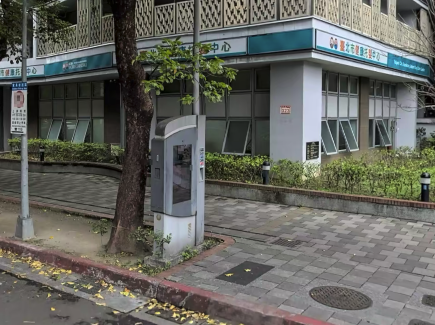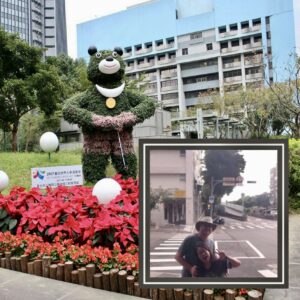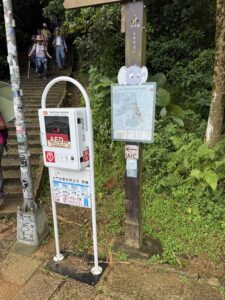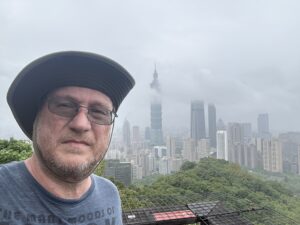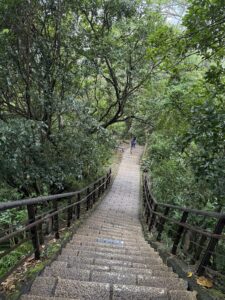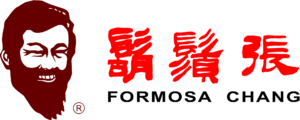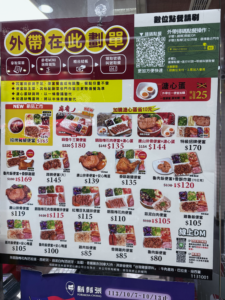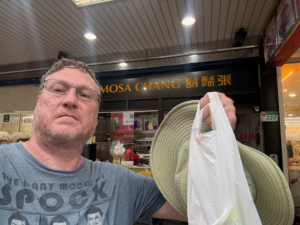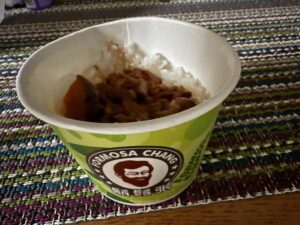October 16, 2024
Last full day in Taiwan!
Tomorrow, we must leave at 8:00 AM to get to the airport, so there will be nothing but the business of travel.
Chuwan and I got out reasonably early and had breakfast at WMD. Near the restaurant, there’s a little kiosk-like thing at the corner of Jiankang Rd & Baoqing St. If I recall correctly, it’s been there since at least 2019, but I didn’t know what it was. It looks like an informational kiosk in Chinese. (The picture included here is lifted from Apple Street View.)
Today, I was casually looking at it and realized it had a camera on it, and even though Chuwan reads Chinese, she still wasn’t sure exactly what it was for.
Nonetheless, we had it take a picture of us, and it gave us a QR code, which allowed us to download this picture of us on the street corner. The picture is superimposed on top of an image of a topiary bear mowing the lawn.
We have absolutely no clue where that bear is — it’s not anywhere in sight of where we took the picture — nor why they would want to superimpose us over that bear. We now have this picture as a memory of the bear we’ve never seen.
Taiwan is a quirky place.
Chuwan left to meet with Melz and go to the textile trade show, and I was left contemplating my list of things I wanted to do.
Although my back hurt yesterday, I didn’t take any pain medicine until bedtime. I hoped my luck would hold out again today, and so I hatched what might be the worst possible plan for the day: To climb Xiangshan.
Xiangshan means “Elephant Mountain,” and if you’ve ever seen a panoramic skyline view of Taipei, it was probably taken from Xiangshan. It is situated within the city and very near the upscale area that boasts Taipei 101.
Guidebooks will tell you it’s a short (they sometimes even use the word “easy”) walk to the top, made more “accessible” by stairs. If you are unfamiliar with Taiwan, you might not realize that all the mountains are steep as hell. I knew that, but I still didn’t have any clue what I was letting myself in for.
I arrived at Xiangshan MRT station, the nearest to the trailhead, at around 11:00 AM, and a new wrinkle was added to the equation — for the first time since we arrived in Taiwan, it was going to be a rainy day. The clouds were moving in, and the sprinkling had begun.
I don’t know how long the Xiangshan Trail is. Various places give it lengths from 0.7 to 1.5 km and a height of only 183 m. I suspect the length variance depends on if you start at the park near the MRT station or at the first set of steps on the trail as you leave the road.
“Trail” is a misleading word. It conjures up images of winding paths amongst shady trees and nature’s splendor. In Taiwan, and, indeed, at Xiangshan, “trail” means rock stairs leading up the side of a steep mountain. I counted one flat section of the trail that was longer than 3 m. Any other flat areas were just landings.








Narrow, steep, wet, and mossy stairs climb through the jungle, and in most places, it is impossible to see anything except the trees immediately surrounding you. It was dumping down rain now, too.
It took 45 minutes to reach the top, and along the way, I passed two AED machines positioned along the trail. I’ve never been on a trail where the managers felt defibrillation was required before. If it’s meant to be reassuring, it isn’t. It’s downright scary.
By the time I reached the top, my Apple Watch had registered that I had climbed 34 flights of stairs. I felt every one of the steps in both my back and my knees.
At one point, when I reached the first photography landing, two young Americans came along and asked me to take their picture, which I did. As they continued on up the mountain, I thought to myself, “I did those guys a favor, and in return, they might have to carry me down off this rock.”
I rested a few more minutes, then started out again. Soon, I caught up with them again, and just about the same time, an Australian woman came down from above.
Seeing our tired and defeated faces, she said, “Hang in there, guys, you’ve almost made it to the top.”
It was what I needed at that moment because I was on the verge of admitting defeat. I probably wouldn’t have quit, but it was crossing my mind in that moment.
The view from the top was good, but the weather wasn’t cooperating. The rain was driving, the wind blowing, and the clouds were obscuring much of the skyline.
The pictures I took from the lower landing were better because the clouds were only wafting about Taipei 101 then, making for a more dramatic photo.
The climb down was much worse. My knees were not cooperating at all, and I found myself side-stepping down, one stairstep at a time, while clutching the railing — when there was a railing.
I witnessed a curious phenomenon twice on the stairs. Whereas most people were taking sensible and cautious steps down the mountain, I saw two different women, at two different times, walking backward down the stairs.
You couldn’t pay me to walk backward down those stairs. Madness.
It took another 45 minutes to get down the hill. The going was tougher, but I didn’t have to stop and rest. Also, the rain had stopped, making it a bit easier.
It was now late for lunch, and I was starving, but I was faced with the daunting (to me) task of trying to navigate the purchase of food. There’s always 7-Eleven, but I have been trying to stretch my Mandarin and get outside my comfort zone.
That didn’t stop me from contacting Chuwan to see if they were done at the trade show. I thought they might want to meet up for lunch, but they weren’t ready, and I would still have to find my own.
I’m always happy to take the path of least resistance, so I hatched a plan. Taipei 101 was nearby, is in a more affluent area, and hosts several international companies. It has a shopping mall in the lower levels and, below that, a food court and grocery store that caters to a more global clientele. It’s likely one of the most English-friendly places in town. I was still going to try to use Chinese, but a reliable fallback was appealing.
The food court was absolutely packed. I circled the entire area several times, and there wasn’t any available seating. Crowds of people with trays of food circled like zombies searching for brains as they looked for a seat, and I hadn’t even negotiated to get food yet.
I was also a bit embarrassed by my appearance. Typically, I don’t give a flying fuck what anyone thinks, but Taipei 101 was loaded with men and women dressed professionally, down from their offices on their lunch hour. I was dressed down for hiking, drenched in rain and sweat, looked like death warmed over, and I would certainly have to share a table with other diners. Even I thought this was over the line.
I bailed out and caught the subway back to our home base area, hoping to spy something or try my luck at Yoshinoya or Sukiya.
Lu•Rou•Fan (braised pork scrapings over rice) is a beloved Taiwanese dish. I’ve nibbled at it a couple of times on past trips and was neither offended nor impressed with it, but it was always served to me as a side dish to something else (like a pork chop or a chicken leg) and in very small quantities — like someone sprinkling a light garnish on rice.
Although I never wrote it down on my “to-eat” list for this trip, I had decided before we left to go somewhere and try it properly.
Independent of this decision, a restaurant chain caught my attention over my last few trips. Featuring distinctive artwork of an Asian man with an unusually prominent full beard, I had begun to notice their distinctive signs, which had risen above the noise of all the signs assaulting my senses. In English, the name is Formosa Chang, but I had jokingly started calling it “Beardy Chang.”
It didn’t appear particularly foreign-accessible, and I’d never really gotten close enough even to know what they sold. There was one near our Airbnb and I asked Chuwan what it was. “They’re famous for their bian dang (That’s “bento” for people more familiar with the Japanese term, or a boxed lunch, usually taken on the train) and their luroufan.”
“Oh, really?” I thought, and packed that away for future use. Today might be the day.
Another little tidbit I learned is that in Chinese, their name isn’t “Formosa Chang.” It’s “Bearded Chang.” Since I’d been calling him Beardy Chang in my head for years, this amused me no end. That is good logo design!
As I passed, there was no one there — no customers, and, more importantly, no obvious employees. Sideling up from the blindside, I approached the posted menu. It was in Chinese, of course, but it was a picture menu.
Nothing was obviously a serving a luroufan, and it seemed to be a boxed meal menu. That wasn’t a problem, I was very hungry, and would have eaten a chicken leg or pork chop, but I was hoping to find a meal that featured, as its main course, luroufan. There were a couple that looked possible, but I don’t know the character for “lu” and I was hesitant.
…and then the employee spied me.
She immediately came to the window to help me. Realizing that I was looking at the menu, she pulled out a laminated menu and handed it to me. “Oh, excellent, they’ve got English menus!”
Nope. It was the same as on the wall. I was committed, and I was going to go for it; I would try to communicate in Chinese. “Nimen you mei you luroufan?” (Do you have luroufan?)
“You a,” (We have it) she replied, thankfully realizing I was not conversant and keeping her answers simple. I expected her to point out which of the likely meals was the luroufan, but instead, she reached into a drawer and rummaged around for another menu. She took the other menu back, handed me the new one, and then pointed to a picture of a bowl of luroufan.
OK, let’s do this. “Xie Xie. Wo yao yige wan.” (Thank you. I’d like one bowl.)
Again, all props to her, she kept it dead simple. “Yao xiao wan haishi da wan ma?” (Do you want a small or large bowl?) (She also pointed at the prices for the large and small bowls as she asked.)
I had no concept of how big these bowls would be, nor if I would like the food I was buying. Erring on the side of caution, I went small. “Xiao wan.” (Small bowl)
This was the first I felt like I’d made a misstep, because she looked at me oddly for a moment, and then countered with, “Yao dan ma?” (Do you want an egg?) While she pointed at the eggs on the menu. I’m not sure if it was a tea egg or a century egg, but I wasn’t feeling that adventurous.
“Bu yao, xie xie.” (No, thanks)
She told me how much it was, which was not much, I paid, and she gave me a bag of food, and off I went back to the Airbnb feeling pretty damned self-satisfied with myself.
Back at the Airbnb, I figured out what the misstep was: A small luroufan is very small—definitely a side dish item rather than a main dish. I devoured it because I was hungry and also because it was very good. I enjoyed every bite of it except for one weird meat-colored vegetable (seen on the left side of this picture) that was absolutely revolting.
I would eat luroufan again, but ensure I got a larger portion next time.
When Chuwan and Melz returned to my in-laws’ place, I was called over. It was time for one last family dinner. In consideration of me, the family would go to a nearby Japanese/Tonkatsu restaurant for dinner.
That is until I got there and found out that my mother-in-law did not want to go, so they ordered tonkatsu for takeout instead. They don’t actually have enough table space in their house to support nine people, so that was a bit comical.
Was it good? It was OK. Was it tonkatsu? No. How can it be tonkatsu without tonkatsu sauce? It was yet another Japanese-style pork cutlet, like we had at Sun Moon Lake.
It’s the thought that counts, right?
Tomorrow morning will just be a short farewell in the morning before we head off to the airport, so there were lots of tears this evening. These trips always seem to end in tears. I wish there were something I could do or say to ameliorate it, but human emotions are not subject to logic.
